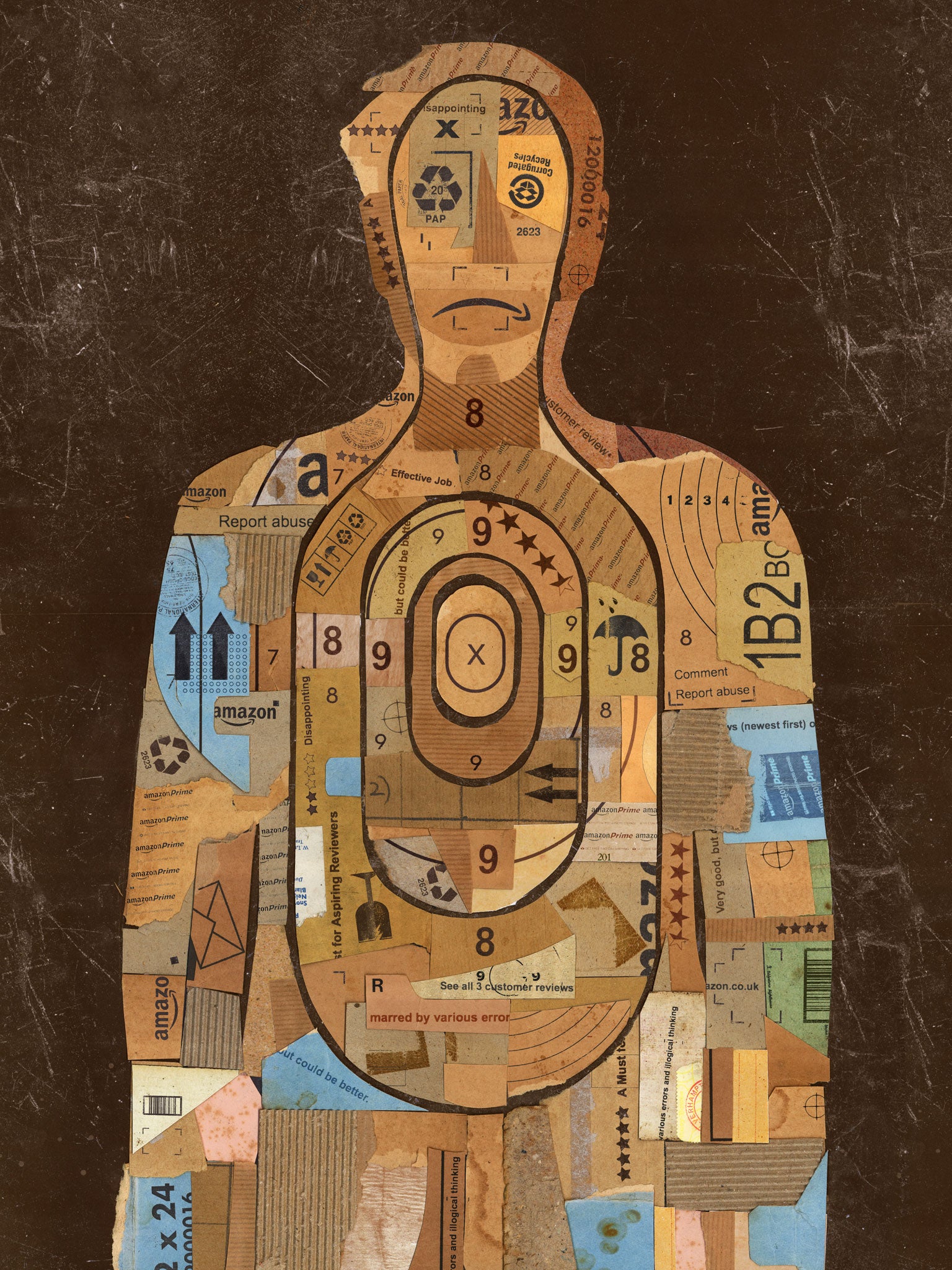Amazon's most prolific reviewers: Meet the people whose lives revolve around rating products
From music to vacuum cleaners, every product on Amazon is up there to be rated and argued over. And some people do an awful lot of it. Is this urge entirely healthy, asks Nathalie Olah

Your support helps us to tell the story
From reproductive rights to climate change to Big Tech, The Independent is on the ground when the story is developing. Whether it's investigating the financials of Elon Musk's pro-Trump PAC or producing our latest documentary, 'The A Word', which shines a light on the American women fighting for reproductive rights, we know how important it is to parse out the facts from the messaging.
At such a critical moment in US history, we need reporters on the ground. Your donation allows us to keep sending journalists to speak to both sides of the story.
The Independent is trusted by Americans across the entire political spectrum. And unlike many other quality news outlets, we choose not to lock Americans out of our reporting and analysis with paywalls. We believe quality journalism should be available to everyone, paid for by those who can afford it.
Your support makes all the difference.Ralph Moore is a semi-retired teacher from Bishop's Stortford who divides his time between working at his local school and writing reviews for Amazon. In five years he has produced more than 2,600 of them – working out at 1.3 reviews per day – and is in the top 300 of the site's global reviewer rankings. He is one among thousands for whom Amazon reviewing has become a way of life, and he serves as a window into one of the more bewildering, and surprisingly fraught, corners of the internet.
Arriving at his home, I am met by the family's Staffordshire bull terrier Snickers, then by a stack of CDs stretching the height and length of the hall. "Nothing," I am told, compared with the stash Mr Moore keeps upstairs.
Trained as a singer in New York during the 1980s, where he briefly dated soprano Renée Fleming, it was here that Mr Moore, who is 60, developed his understanding of vocal recordings, while harbouring dreams of one day become a writer. "I don't have a novel in me," he says, "but I have always liked the form and style of reviews." The arrival of Amazon allowed him to fulfil his ambitions.
Niche reviewing lends Mr Moore a rare integrity in an online environment built on uncertain credentials. He is a nerd of the highest order, a badge he wears with pride to accompany a smile that is permanently etched into the lines of his face. But for many others, the act of reviewing is less a source of enjoyment than the subject of mild and, in some cases, acute fixation.
The most prolific reviewer in Amazon's history, an American called Harriet Klausner, died last year. Submitting more than 31,000 reviews in just over 10 years, Ms Klausner, who lived in Atlanta, had become the target of a campaign to expose instances of suspected "supplier involvement" – companies providing high-ranking Amazon reviewers with free goods, and in some cases payment, in exchange for positive write-ups. Ms Klausner had been accused of selling free products as a secondary source of income, with books supposedly appearing on trading site half.com before their official release.
The story also exposed a culture of savage infighting. Amazon's review function had become a stage for obsessive behaviour, bullying, trolling, sabotage and duplicity. It might sound strange to those on the outside, but as Mr Moore says, the level of hostility waged at certain echelons of this unlikely subculture can take an appalling toll.
"Given what I write about, you would think I'd escape the wrath of trolls," he says. "But it isn't the case. One of mine operates under 40 to 50 different pseudonyms and appears to track my every move."
Amazon has tried to crack down on online bullying and third-party involvement since 2012, reportedly shutting down accounts and deleting en masse reviews that it suspects of being fake (tell-tale signs include users who post too frequent and often overwhelmingly positive reviews). The media interest that followed Klausner's death was likely a catalyst for the 1,114 lawsuits that Amazon filed in 2015 against individuals and organisations involved in such activity.

Amazon also set up a new system for ranking its reviewers. "Top reviewers" are now ranked according to how many other readers find their comments helpful, as opposed to the previous system of rank according to most prolific output.
But that system is also open to abuse, and Amazon's vast, monolithic structure makes policing the review function on any detailed level impossible. Amazon still has a long way to go to monitor the dysfunctional behaviour of some of its most prolific users, some of whom claim that the review service fosters a sense of competition among reviewers for the sake of driving up sales.
Scrolling through the site's top 10 ranked reviewers, few seem to boast any clear areas of interest equivalent to Mr Moore's, and those who do rise to the top appear to do so through an indiscriminate approach of reviewing almost anything – from moisturiser to push-pins to thermal leg warmers.
I spoke to a reviewer who was at one time ranked No 1 in the UK charts. His average score was the lowest of any other reviewer in the Top 10, reflecting a system that he feels is increasingly swayed by the imperative to keep brands and suppliers onside. He said he had thought that the ranking system improved reviewing and promoted impartiality but now was concerned that it encouraged people to post more reviews, with the risk of some people even becoming "addicted".
It was a bold claim and one that seemed mildly hysterical in the context of an e-commerce reviewing platform. Nevertheless his remarks about "addiction" may not be entirely fanciful given the fierce competition I had come to witness. I asked the same reviewer if he feared being toppled from his post. "No, no," he insisted. "It would be a relief, more than anything."

He claimed that he had been targeted with negative votes and abusive messages from fellow reviewers. This is echoed in emails I receive from other users. In the course of a few weeks I receive several emails from different accounts claiming to have ruinous information about one of the other high-ranking reviewers, sometimes accompanied by details about their private life, links to their professional page at the firm where they work, and in-depth speculation about the type of person they might be.
Talk of this reviewer reaches such a cacophony that at one point I am unable to distinguish between emails, as one after another arrives repeating a similar message to the last, sent by a combination of active reviewers and those who admit to having been banned because of their antisocial behaviour.
It's clear that this reviewer is the victim of online abuse, and still unclear if they are also a perpetrator. I come to learn that it is possible to be both. More worryingly, I begin to suspect that the same person might be authoring several of the accounts that start to email me with alarming regularity. They comprise lengthy, frenetic messages sent within minutes of my replies, followed by phone calls, voicemail messages and texts. The repetitive tone indicates either one fanatical voice, or a small cohort whose collective identity is centred around preventing the target from receiving any kind of positive publicity.
"Who are you?" I am asked. "Why are you doing this?"; "I'm not providing you with quotes."; "Don't repeat what I say to anyone else." It's my first taste of online warfare – dramatic and absurd – but nevertheless still mildly intimidating.
I speak to a woman who was ranked in the UK top 10 but has been forced to quit because of what she terms "problems with the system". "She might have just got the wrong end of the stick," says the former No 1, who despite claiming to have never left a negative comment on another user's review, goes on to admit that the woman in question had filed a complaint of harassment against him to Amazon.

Reluctant to meet in person, the woman was unable to elaborate. Still, her reticence and repeated questioning of my motives when we do chat via email suggests that her experiences of reviewing for Amazon haven't been entirely positive. As seems to be the case for a number of people I speak to.
In response to all this, Amazon declined to speak over the phone, providing only a short statement, reiterating their goal of providing customers with useful reviews and attempting to police the system by closing fraudulent or abusive accounts. "We continually evolve the Amazon customer reviews system to make it more helpful to customers and improve the experience over time," the statement read. "We use a number of mechanisms to detect and remove the small fraction of reviews that violate our guidelines, close abusive accounts, and earlier this year filed lawsuits against a number of individuals and businesses who were abusing the system."
In reality, Amazon has very little agency over the politics of its reviewing platform, whose tendency to attract abusive behaviour is likely the result of the unique opportunity it affords people of a certain predisposition. It's a means of self-publicity that allows those so inclined to hide behind the appearance of delivering an important service. Unlike the bare-faced extroversion of other social media platforms, it attracts a unique strand of introverted egotism, one that appreciates attention but not necessarily the more conventional, or transparent, means of obtaining it.
Mr Moore says that ego plays a large part in writing reviews, and a certain narcissism certainly seems to underscore most of the conversations I have. Many of the reviewers I speak to come with prepared answers to my questions. In some cases, they "correct" my line of questioning with their own. Without the same level of self-assuredness as those who occupy the conventional blogosphere and accrue large followings on social media, the online reviewer is an altogether more sensitive breed, and seemingly much less equipped to deal with the inevitable > vitriol that comes with publishing almost anything online.
"It's nice to see yourself build a body of work and to express your opinion about things you care about," says Mr Moore. "But I didn't have the vaguest idea about this strange ranking system when I started and I still have absolutely no interest in being a part of it."
I believe him. Reviewers who echo this sentiment are among the happiest. Clare O'Beara, a tree surgeon and former show jumper from Ireland, got into reviewing as a way of reminding herself about the books she had read and loved.

"Work dried up following the economic crash," she explains. "My husband had high-speed broadband installed soon after, which really changed everything and gave me a new way of discovering and writing about fiction." These days Ms O'Beara, who is 50, receives digital copies of books that she will often read within the space of a day. "No serial killers, no flesh-eating bugs, no zombies," she says of her tightly run ship.
Now an independently published author herself, Ms O'Beara sets her young adult and romance fiction in Ireland, and often within the show-jumping scene. She credits Amazon with providing a platform that has allowed her to develop her writing while meeting like-minded people. Mr Moore also tells me about an elderly woman in Ohio with whom he chats on a regular basis and will often share CDs.
For both reviewers, there's a lifelong interest that pre-dates either the arrival of Amazon, or indeed high-speed internet. Mr Moore is keen to continue a tradition of well-executed, classical music reviews. "An orchestra in full flow is one of the greatest offerings of Western civilisation," he says. "It deserves our full attention: strong writing instead of all this wow-ing, fab-ing, liking and sharing…"
We are seated under the natural light of Mr Moore's double-glazed conservatory, drinking tea, eating cake and doing impressions of young people. The heavy crossfire between Amazon reviewers seems a long way away and yet I wonder whether it is exactly this environment that allows him to main- tain a healthy distance from the petty politics of the scene.
"I didn't want to slip into the trap of getting bored in my retirement," he says. "Of saying, 'I ought not look out of the window this morning for fear of having nothing to do this afternoon'." It's a fun distraction, serving as an afterthought to the bigger concerns of family and a life spent travelling the world.
For Mr Moore, Ms O'Beara and others like them, writing reviews is a way of helping out and, to an extent, showing off. There's an assumption that the internet has opened up conventionally educated pursuits – publishing, broadcasting and yes, reviewing – to all. And it has. But it has not provided the security needed for people to do so with confidence and self-belief. For others, Amazon reviewing has become a worrying marker of self-worth and an unlikely reminder of the tendency for loneliness and low self-esteem in our increasingly digitised world.
Join our commenting forum
Join thought-provoking conversations, follow other Independent readers and see their replies
Comments